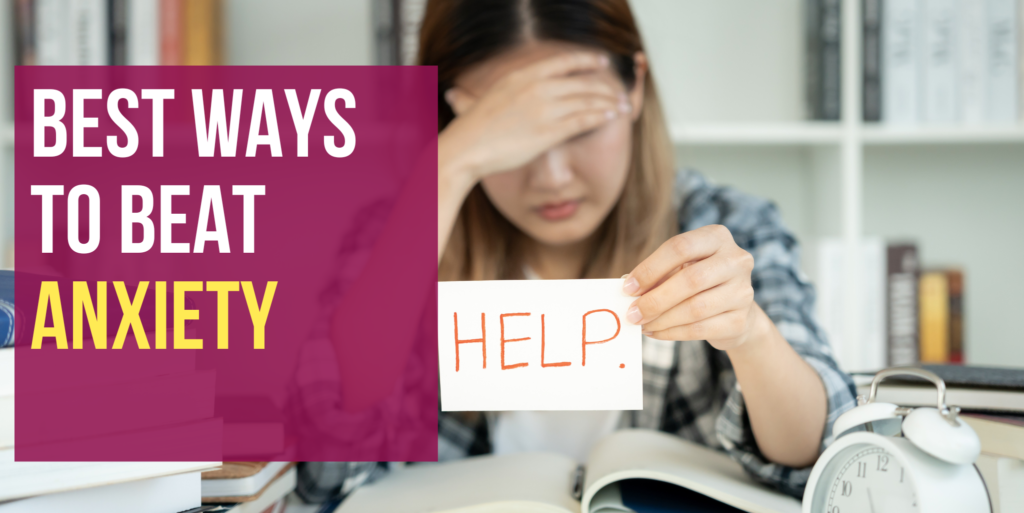Anxiety can interfere with our day-to-day functioning and general well-being. Many people ask, how to beat anxiety? Experiencing occasional anxiety is a part of our life, anxiety disorders can cause our feelings to become regular, strong, and exhausted. Many common anxiety symptoms are feelings of helplessness, nervousness, and fear of doom, moreover with physiological symptoms such as hyperventilating, sweating, shaking, elevated heart rate, and l compulsive thinking associated with panic triggers.
These symptoms might result in people avoiding particular environments and special circumstances, making it challenging to carry out daily tasks. If anxiety starts negatively impacting one’s life and relationships then it is important to seek assistance from medical professionals. It is important to go through a comprehensive evaluation to rule out any underlying physical health difficulties, before getting treatment from a mental health professional. Keep on reading to know the best ways to beat anxiety.
10 Ways to Beat Anxiety:
-
Exercise Regularly:
Regular physical activity is one of the best ways to beat anxiety immediately. Exercise releases endorphins, which are feel-good neurotransmitters produced by the body. Exercise can help lower the stress hormones cortisol and adrenaline. Engaging in an activity you enjoy, whether it’s a yoga class, short walk, or cardiovascular workout, can significantly reduce the symptoms of anxiety and improve your mental health.
-
Mindfulness Meditation:
Two long-suggested benefits of meditation include stress reduction and mental calmness. It can greatly help beat anxiety. By practicing mindfulness meditation, people can learn to evaluate their worried thoughts without passing judgment and eventually let them go. By focusing on the breathing or other physical emotions, one can typically bring their attention to the present moment when using this technique and easily beat anxiety.
-
Diaphragmatic Breathing or Deep Breathing Exercise:
Diaphragmatic breathing, another name for deep breathing exercises, can be a helpful method for eliminating anxiety forever. Our shallow, fast breathing habits during anxiety often exacerbate tension and panic attacks. We can initiate the relaxation response in our bodies through deliberate diaphragmatic breathing. Even a short daily session of diaphragmatic breathing exercises can assist in controlling the nervous system and nurture feelings of peace and well-being, while also allowing to beat anxiety.
-
Get Enough Sleep:
Getting enough sleep is an important yet often overlooked component of dealing with anxiety. People can effectively manage their anxiety by keeping a regular sleep schedule, relaxing at night, and avoiding using electronic devices before bedtime. Sleep is directly connected to our cognitive function, with incomplete sleep impacting memory, focus, and decision-making ability. Individuals who make getting enough sleep a priority might benefit physically and emotionally.
-
Cognitive Behavioral Therapy (CBT):
The goal of cognitive-behavioral therapy (CBT), a very successful type of psychotherapy, is to recognize and challenge anxiety, thoughts, and behaviors. People can acquire effective coping mechanisms to control their anxiety symptoms and change out their negative thought patterns for more positive, constructive ones through organized sessions with a licensed therapist. CBT has been studied thoroughly and has proven to be effective in treating a range of anxiety problems.
-
Identify Triggers:
Understanding the root causes of your anxiety might help you better control and deal with its symptoms. Think about the circumstances, people, or places that tend to trigger feelings of anxiety. Once you’ve determined these triggers, you can create plans to avoid or deal with them successfully. This might involve establishing limits, exercising assertiveness, or asking friends, family, or a therapist for help.
- Eat Healthy Foods:
Keeping up a healthy diet is important to learn how to beat anxiety. Foods high in nutrients give you the energy and nutrition your brain needs to perform at its best and manage stress. Eating a healthy, well-balanced diet high in fruits, vegetables, whole grains, and lean meats promotes mood stability, cognitive function, and general well-being. Reducing sugar, caffeine, and processed food intake can assist in maintaining energy levels and minimize the mood swings caused by anxiety.
-
Shout It Out:
Letting go is sometimes the best approach for releasing buried anxiety. Find a quiet area where you are at ease, then give yourself permission to express your emotions. Screaming, shouting, or even high-pitched singing may be required for this. Emotional vocalizations can be therapeutic and help the body release stress. Just be aware of your surroundings and make sure you’re not causing any disturbances to others.
-
Learning About Anxiety:
Learning more about anxiety might help you understand the condition and feel more in control of your mental health. Numerous resources are available, including books, online articles, support groups, and instructional courses. By learning about common coping mechanisms and the underlying causes of anxiety, you can assemble a personalized toolkit for effectively handling anxiety symptoms. Remember that being informed allows you to select the mental health care you require confidently.
-
Avoid Caffeine:
Caffeine can provide a short-term energy boost, but too much of it can exacerbate anxiety symptoms and interfere with sleep. If you’re prone to anxiety, cut back on your intake of caffeinated drinks like coffee, tea, and energy drinks. Try other beverages, including decaf coffee or herbal teas, and observe how they impact your anxiety levels. Keep in mind that the key to consuming caffeine is moderation.
Conclusion:
Anxiety management requires an extensive plan that takes care of the body as well as the mind. By incorporating anxiety coping skills for adults such as exercise, meditation, and deep breathing into your daily routine, you can effectively beat anxiety without medication and improve your overall quality of life. Keep in mind that every person’s experience with anxiety is different, so don’t be afraid to ask for professional assistance if you need it. With the right tools and strategies, you can learn to navigate anxiety with confidence and resilience, even during the darkest of nights.
Written by: Adeeba Shah



